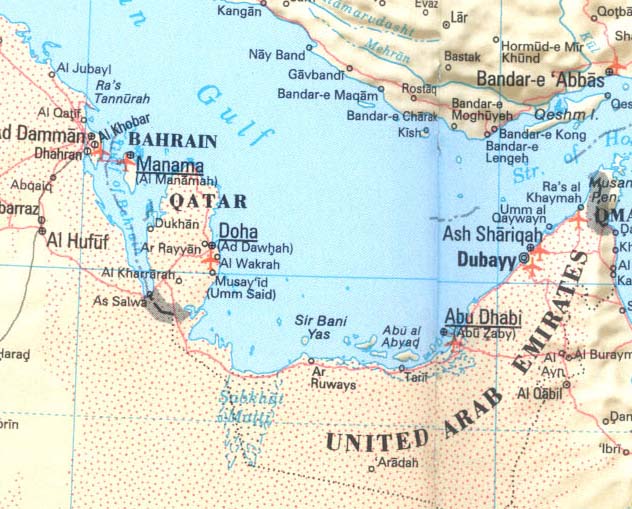
Winter rains have been with us for the last few days – quite heavy today, flooding roadways, collapsing road edges not designed for rain, filling deep holes but appearing as shallow puddles. The inside lane of the round-about tends to be treacherously deep. Pumps are positioned by the sides of some roads to lower the depth of the collected water and traffic jams up the highways. Despite this some large SUVs insist on travelling as if there were no treacherous conditions. The rear view from my balcony shows the threatening skies around 5:00 pm and the lights of the traffic, heavily backed up as the cars attempted to bypass choked up roads in front of the City Center and only succeeded in attempting to join the queue half way up the road.
Visitors to the Gulf States this week included President Bush who stopped in Bahrain and then hopped over to the UAE skipping Qatar. As an editorial in the Online Peninsula indicates “US President George W Bush is likely to return home empty-handed at the end of his marathon tour of the Middle East. Despite his repeated calls for peace between Israelis and Palestinians by year end, the prospects to end the decades-old conflict seem bleak. He used his visit to the region to hold high-level talks with the leaders of Israel, Palestine Authority and some heads of states in the Gulf. … It was also surprising to note that Bush did not elaborate much on troop cuts in Iraq this year or about the ongoing insurgency in Baghdad or the tensions at the Iraq-Turkey border over the Kurdish issues. … He indeed was up to something else, something really serious that concerns America. The real cat was out of the bag during the Kuwait leg of Bush’s tour when the US president embarked on a vigorous campaign to rally the oil-rich Gulf states around America against Iran.”
The U.S. President’s absence in Qatar was made up by President Sarkozy, however, as the local paper, the Online Peninsula, reported today, who “tomorrow starts a three-nation tour of Gulf states eager to take up his offer to share France's expertise in civilian nuclear technology with the Islamic world. On his first trip to the region since taking office in May, he will visit Saudi Arabia, Qatar and the UAE, three states interested in developing a civilian nuclear programme despite their oil and gas wealth.”
It is ironic that as Bush attempts to rally Gulf States against Iran and its nuclear building program, France is in town offering expertise in building civilian nuclear programs. "The sharing of civilian nuclear (technology) will be one of the foundations of a pact of confidence which the West must forge with the Islamic world," Sarkozy said after signing the agreement with Algeria last month. Amid concerns over Iran's nuclear ambitions and growing regional clout, the six Arab monarchies of the Gulf decided in December 2006 to develop a joint nuclear technology programme for peaceful uses. The UAE's energy undersecretary, Ali bin Abdullah Al Owais, has said the Gulf states aim to have a joint nuclear reactor by 2025. But in parallel with the joint plan, "each country can do whatever they wish" and pursue its own nuclear activities as a means to ensure the future of its industries, another Emirati official said, requesting anonymity. "I don't think there is any contradiction. ... Although the UAE will be the only country on Sarkozy's tour to sign a nuclear-related deal, nuclear energy cooperation is also likely to come up during his talks in Riyadh and Doha, where the idea is at an earlier stage."



